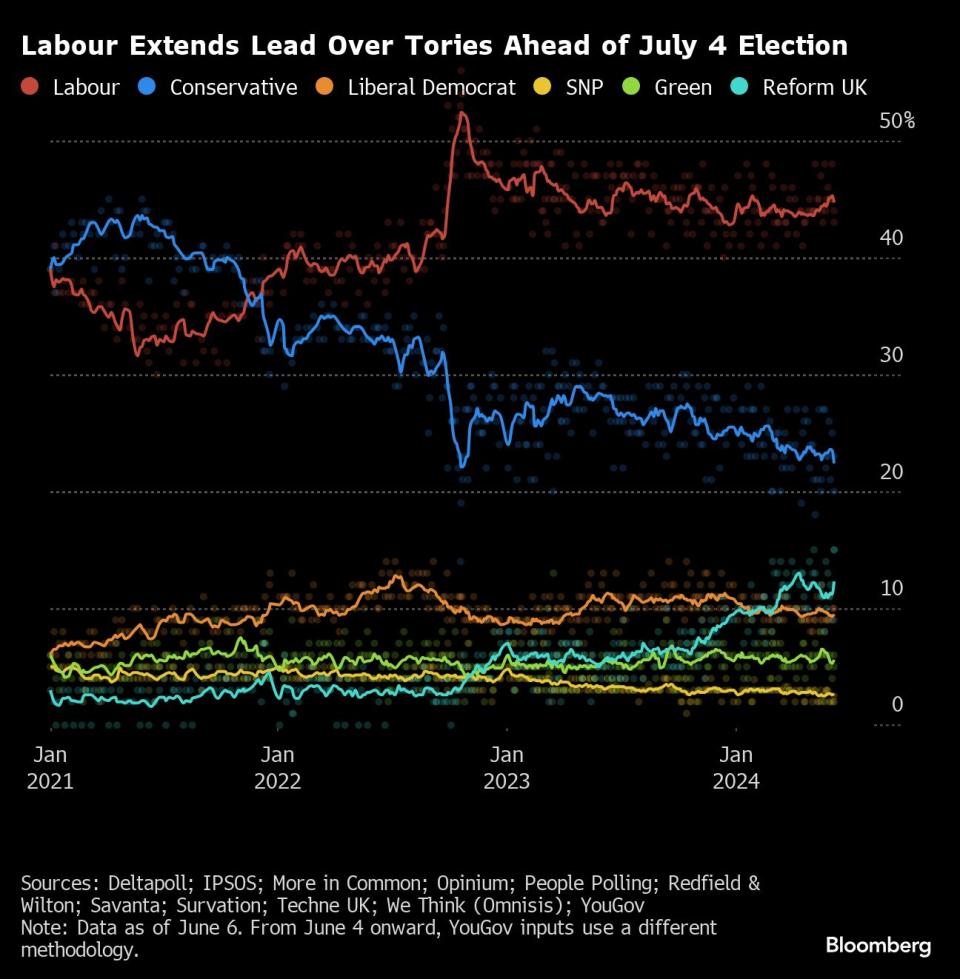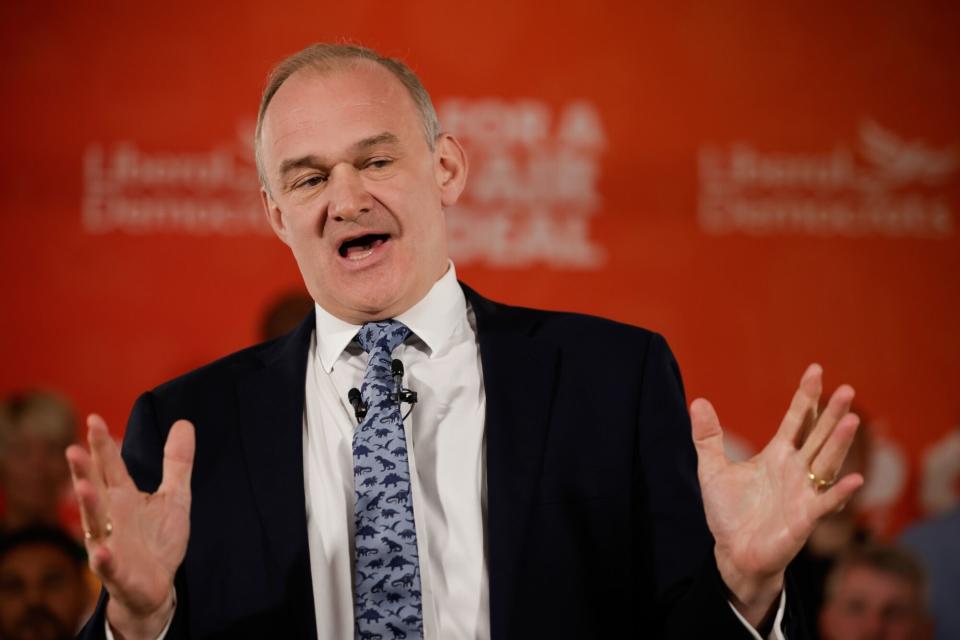Liberal Democrats Seek to Tax UK Banks, Squeeze Rich to Fund NHS
(Bloomberg) -- The Liberal Democrats pledged to tax the rich, frequent fliers and banks to fund a £9.8 billion ($12.5 billion) package for social care and the National Health Service, as the centrist party tries to take seats from Rishi Sunak’s Conservatives to influence the next government after July 4.
Most Read from Bloomberg
Russia Is Sending Young Africans to Die in Its War Against Ukraine
NYC Landlord to Sell Office Building at Roughly 67% Discount
Investment Bank Moelis Probes Incident After Video of Employee Appearing to Punch Woman
Apple Unveils ‘AI for the Rest of Us’ in Bid to Retake Spotlight
Capital gains tax and air passenger duty will be reformed to hit the wealthy and business travelers and reduce costs for lower earners and holidaying families, according to the party’s manifesto published on Monday. The Liberal Democrats also reiterated their long standing policy to try to rejoin the European Union single market to boost trade and growth.
Though it’s unlikely the traditional third party in British politics will be able to implement their idea — the latest polls put them in fourth behind Labour, the Conservatives and Reform — they could win enough seats to influence who forms the next government if the election is as close as it was in 2010 and 2017.
More broadly, Davey will hope to shape the campaign debates by putting the issue of social care — close to a so-called third rail in British politics — front and center. The Liberal Democrat leader has built his campaign around attention-grabbing stunts combined with poignant videos about caring for his disabled son, while highlighting the wider breakdown in the care sector.
“How the Conservative party has treated our NHS is a national scandal,” said Liberal Democrat leader Ed Davey. “By ending the health and social care crisis, we can boost our economy by getting people back to work whilst giving people the dignity they deserve in their hour of need.”
Banks, oil producers and tech giants face higher taxes as the party plans to raise a total of £26.9 billion a year by 2028-29 to pay for an equivalent increase in spending on health, education, defense and international aid. A further £19.7 billion a year will be borrowed for investment, mostly on tackling climate change and building 150,000 social homes a year, the party said.
The Liberal Democrats said its plans are fully costed and meet two fiscal rules, that day-to-day spending is covered by revenues and that debt is falling as a share of GDP in five years’ time. Those rules are the same as the poll-leading Labour Party’s.
The party also said it will repair the UK’s “broken relationship with the EU” and seek to rejoin its single market, with recent polls show a majority of Britons believe it was wrong to leave to leave the bloc.
The Liberal Democrats have long advocated higher taxes on banks and oil firms, but its plan to reform to capital gains tax and air passenger duty are new.
Under the party’s plans, people who make up to £50,000 a year in capital gains would be better off because the tax free element would be lifted to £5,000 from £3,000, and an inflation allowance would be introduced. Above £50,000, however, the tax rate would rise to 40% from 20%. Those making over £100,000 a year from capital gains would be taxed at 45%.
The party said the changes would leave the vast majority of earners better off, but that the measure would raise £5.2 billion from the top 0.1%.
A similar sliding scale would be introduced for air passenger duty. Taking one international return flight a year would incur no duty under the reforms. Only people flying more than three times a year would face higher costs, while private jets would incur a super-tax. The policy would raise £3.6 billion a year.
The party would also increase funding for the tax by £1 billion, to help it recover a net £7.2 billion from tax avoidance.
Banks face a £4.25 billion increase in levies, according to the manifesto.
After a series of eye-catching by-election wins during the last Parliament, the Liberal Democrats are hoping to make further gains by picking off voters from the Tories in the so-called Blue Wall, a band of about 50 Conservative seats in the south and east of England that opposed Britain leaving the European Union and have demographics that are increasingly young and liberal.
The party has endured a roller-coaster ride in recent elections. In 2010, the Liberal Democrats formed a coalition government with the Tories when then-Conservative leader David Cameron failed to secure an outright majority. But they were punished by the electorate in 2015, and the recovery had been long and slow until dissatisfaction with the Tories provided an opening.
Davey’s argument is that the state needs more money to tackle the crisis in the NHS and social care. He said the party’s plan would include boosting cancer survival rates, giving everyone the right to see a general practitioner within seven days and a 10-year capital investment plan for hospitals.
“We can save our NHS, we can fix the care crisis, we can give people a fair deal,” Davey said at the manifesto launch. “Caring has been in the shadows for far too long, and I’m proud that as a party we have brought it into the light.”
Meanwhile Sunak’s Tories are due to launch their manifesto on Tuesday, and the party promised over the weekend to cut £12 billion from welfare payments, potentially giving it room for cuts to personal, property or inheritance taxes.
Labour is due to publish its manifesto on Thursday, though the party has indicated it’s unlikely to contain any major surprises. The party has pledged not to increase income taxes, national insurance or value-added tax, but is facing questions about how it would fund Britain’s crumbing public services.
(Updates with more manifesto pledges from second paragraph.)
Most Read from Bloomberg Businessweek
As Banking Moves Online, Branch Design Takes Cues From Starbucks
Legacy Airlines Are Thriving With Ultracheap Fares, Crushing Budget Carriers
Sam Altman Was Bending the World to His Will Long Before OpenAI
Food Companies Hope You Won’t Notice Shortages Are Raising Prices
©2024 Bloomberg L.P.

 Yahoo News
Yahoo News 


